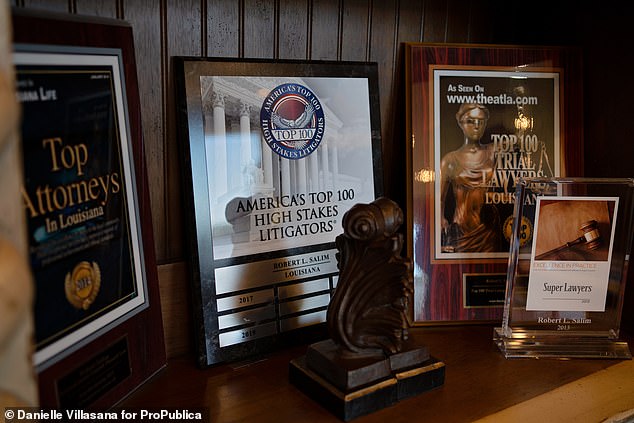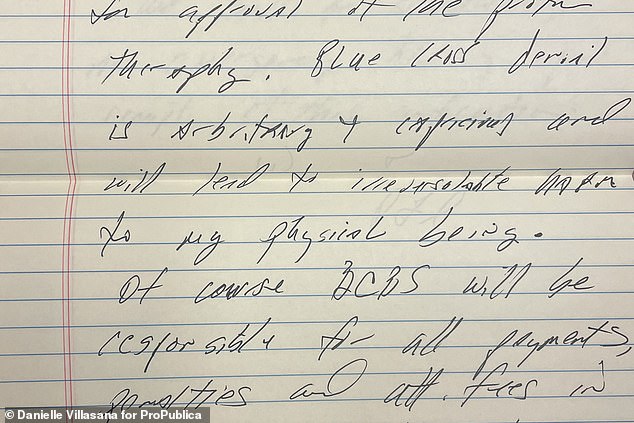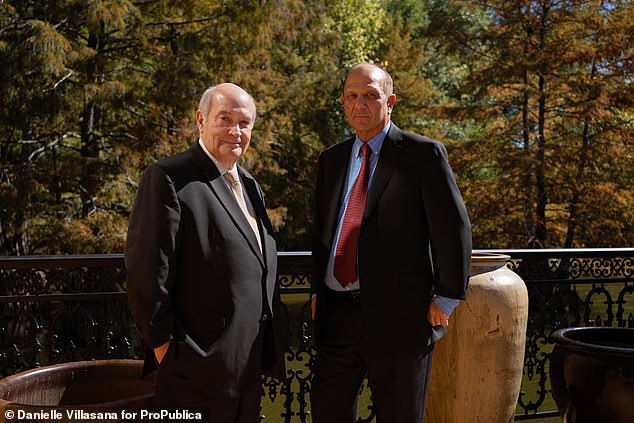Robert Salim – one of America’s leading trial lawyers – successfully sues Blue Cross for refusing to pay for his cancer treatment
A top lawyer who has won hundreds of millions in claims for other patients has successfully sued his own health insurer after it refused to pay for his cancer treatment.
Robert Salim was diagnosed with stage four throat cancer in 2018. He had an inch-long tumor under the back of his tongue and what his oncologist, Dr. Clifton Fuller of MD Anderson Cancer Center, called “massive oral disease.”
Dr. Fuller told him his best chance for treatment was proton beam therapy, which focuses a concentrated beam of radiation on a tumor, because it is so precise that it is more effective and has fewer side effects than other treatments.
The hospital approached Salim’s insurer, Blue Cross and Blue Shield of Louisiana, to ask them to pay, but they refused.
Doctors told Salim that he should instead receive a cheaper form of radiation, which is less precise and has possible side effects including hearing loss and brain damage.
Salim was forced to sue his insurer after they refused to pay for his cancer treatment

Salim is one of America’s top 100 high-stakes trial lawyers
Salim decided to pay the $95,862.95 for the proton beam treatment himself, saying, “If there’s a tumor in there and it’s growing, why are we waiting so long to do anything?” and prepared for a legal battle with his insurer.
Salim is one of the top 100 trial lawyers in America. He has helped obtain settlements worth hundreds of millions of dollars from companies that harmed consumers with unsafe products, including pelvic mesh and pain medication Vioxx.
He told ProPublica: “It’s not about the money for me. I am blessed and we have an extremely lucrative practice.
‘But I would like to see other people who are not in the same situation not being run over by these people. There is no telling how many billions the insurers have made by denying claims on a false basis.”
And he was angry because he had been paying more than $100,000 a year for his and his employees’ insurance.
Salim’s decision to challenge his insurer was virtually unprecedented: Less than 1 percent of patients attempt to undo denied claims, a 2023 study found.
But he was convinced their decision was wrong and wrote a note in 2018 saying: “The Blue Cross denial is arbitrary and capricious and will result in irreversible damage to my physical being.”
He initially appealed their decision, but received responses stating that “the requested proton therapy is not medically necessary for this patient.”
When this did not work, Dr. Fuller requested that the Blue Cross have an independent medical review board, not affiliated with the insurer, investigate Salim’s claim.
He then sent the company a 225-page request containing Salim’s medical records, MD Anderson’s evaluation and outside studies supporting the use of proton therapy.
But the next day they too denied the claim.

Salim uses a private jet to travel to work

Salim wrote a note in 2018 that said, “The Blue Cross denial is arbitrary and capricious and will result in irreversible damage to my physical being.”
The appeal ended and Salim was no further with his claim: he underwent intensive radiation sessions, during which his arms and legs had to be restrained to remain still for 45 minutes at a time.
A few months after his recovery, in February 2019, he decided to sue the Blue Cross to force them to pay.
He struggled to find a lawyer who would handle his case until his childhood friend Ronald Cockern volunteered.
Cockern had never handled such a case before, but decided to give it a try.
The case dragged on for years, with attorneys questioning whether the treatment was necessary and whether the Blue Cross had committed an “abuse of discretion” by denying the treatment without considering all the evidence.
Salim and Cockern argued that the studies they used to dismiss Proton Beam therapy were outdated and “blatantly omitted” other evidence.
The federal magistrate, Judge Joseph H.L. Perez-Montes, ruled in Salim’s favor, reportedly writing that the Blue Cross had “abused its discretion” and used “either outdated or did not relate to the treatment of head and neck cancer’.

Salim and his childhood friend and lawyer Ronald Cockern who represented him in the case
A federal judge subsequently reversed Perez-Montes’ decision and ordered the Blue Cross to pay Salim for his proton therapy treatment. Blue Cross appealed, but lost again.
Despite the court’s ruling, Salim has still not been paid because the judge did not specify an amount.
He expects to receive the full $95,862.95 he paid, but Blue Cross has said it only has to pay Salim the discounted rate it negotiated with MD Anderson at the time of his radiation treatment: $35,170.47.
A decision is expected later this year.
Salim has made a full recovery and said: ‘They were wrong. Proton radiation is not experimental. It’s a wonderful tool. If I played even a small part, it was a very successful trial.”
Blue Cross and Blue Shield of Louisiana declined to comment, citing ongoing litigation.
